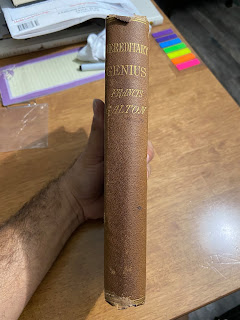As someone who loved collecting vintage books, I was stoked to acquire a first American edition of Francis Galton's pioneering book “Hereditary Genius” for the bizarrely low price of $25 - most copies in good condition like this one sell for an unaffordable few hundred dollars at the minimum.
First published in 1869, “Hereditary Genius” is an important book in the history of science as well as a good example of how racist ideas are respectable in their own times. Galton was a statistician, geneticist and brilliant polymath who was one of the founders of statistics (among other ideas, he was the one who developed the concept of regression to the mean) and biometry or biological measurement. He was also Darwin’s cousin and was heavily influenced by Darwin’s ideas on survival of the fittest and natural selection.
His book was the first to make a serious and fairly exhaustive case that intelligence is inherited and genetic. He made this case almost a quarter century before Gregor Mendel figured out the nature of genes. To do this Galton made a detailed survey of what he called “eminent men” (no women, although he acknowledges this deficiency) and traced their lineage through several generations, making the case that intelligence was preserved. The eminent men included men as diverse as scientists, poets, writers, “divines”, “oarsmen” and “wrestlers from the north country”.
The book is clearly written and argued and was hugely successful both in Europe and the United States. Darwin was smitten by it and wrote:
“I have only read 50 pages of your book (to Judge), but I must exhale myself, else something will go wrong with my inside. I do not think I ever in all of my life read anything more interesting and original—and how well and clearly you put every point!"
But the book was a double edged sword. While the hereditary nature of intelligence is now accepted, Galton ended up making the case for eugenics, social Darwinism and the superiority of certain races (the examples in Galton's book are all Caucasian), arguments that were unsurprising for the times he lived in. While today his book is considered clearly incomplete and flawed, because of its novelty, clarity and reputation of its author, it became a rallying cry for eugenicists and white supremacists especially in the United States who advocated the culling of “inferior stock” to preserve intelligent races, which in their view naturally meant the Anglo-Saxon race.
An important and readable book, very much a product of its times, correct in certain fundamental ways but incorrect, incomplete and dangerous in others.


















